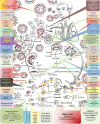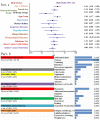HyPE study: hydroxychloroquine prophylaxis-related adverse events' analysis among healthcare workers during COVID-19 pandemic: a rising public health concern
- PMID: 32490532
- PMCID: PMC7313915
- DOI: 10.1093/pubmed/fdaa074
HyPE study: hydroxychloroquine prophylaxis-related adverse events' analysis among healthcare workers during COVID-19 pandemic: a rising public health concern
Abstract
Background: The rising burden of Coronavirus disease (COVID-19) has led to the mass use of hydroxychloroquine by healthcare workers (HCWs). Adverse event profile of this drug when used as prophylaxis is not well known in the literature.
Methods: A retrospective, cross-sectional study was conducted across the country using semi-structured web-based questionnaire among COVID-19 negative and asymptomatic healthcare workers, taking hydroxychloroquine prophylaxis. Descriptive and multivariate logistic-regression models were applied for analysis.
Results: Of the 166 participants, at least one adverse event was experienced by 37.9% participants, gastrointestinal being the most common (30.7%). Risk was higher in participants <40 years age (odd's ratio (OR): 2.44, 95% confidence interval (CI): 1.18-5.05) and after first dose of hydroxychloroquine (51.2%, OR: 2.38, 95%CI: 1.17-4.84). Hydroxychloroquine prophylaxis was initiated without electrocardiography by 80.1% of HCWs. Only 21.6% of those with cardiovascular disease could get prior ECG.
Conclusions: A higher incidence of adverse events was observed when results were compared with studies involving patients on long-term hydroxychloroquine therapy. Younger age and first dose were associated with greater incidence of adverse events though all were self-limiting. Monitoring prior and during prophylaxis was inadequate even among those with cardiovascular disease and risk-factors. However, no serious cardiovascular events were reported.
Keywords: COVID-19; adverse effects; hydroxychloroquine; prophylaxis.
© The Author(s) 2020. Published by Oxford University Press on behalf of Faculty of Public Health. All rights reserved. For permissions, please e-mail: journals.permissions@oup.com.
Figures



